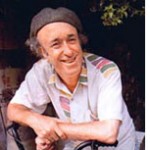By Dan Bloom

CHIAYI CITY, Taiwan — Late last month I got word from a Japanese friend in Tokyo that a dear woman in my life, Celia Bertin, had passed away in Paris at the age of 94.
Mr Watanabe, who speaks and writes French fluently and is a friend of mine from my days in Japan, knew I had been looking for news of her for the past few years,
Celia and I had lost contact in 2011 after a my 30-minute phone call to Paris, and a snail mail letter exchange between our homes in Taiwan and France and a few email exchanges even.
Yes, Celia was still using email when she was 91. That’s the kind of person she was.
Why am I writing this a week or so after her death? Celia Bertin was my college teacher, my lifelong friend and my muse. She married a Jewish man from Boston named Jerry Reich, and they had homes in New Hampshire and Paris. At Tufts University in the late 1960s, Mrs.Bertin-Reich was a writer in residence for several semesters and that’s how we met. I was a student then. She was a French novelist and journalist intent on exploring American life and culture.
In 1972, she wrote a novel in French titled Je t’appelerai Amerique which translates as “I’ll call you America.” It has never been published in English, but I read it in French when the author sent me a copy. It was a story about life on an American college campus in the Vietnam War era of the 1960s and early 1970s.
The reason I am writing about Celia today in the San Diego Jewish World is that Celia spent her early 20s fighting the Nazis in Occupied France. She joined the French Resistance when she was just 20 years old, and according to the stories she told me, she served as a kind of French-English translator and interpreter for the British and American intelligence services operating in Paris in 1940. She hated the Nazis, and she counted many Jewish friends in Paris. She never really liked talking about that period of her life, during the war, with its sadness and tragedy all around her, but from time to time when we chatted in Boston coffee shops she told what it was like in Paris in those dark days.,
She was that kind of woman: fearless, brave and committed to fighting for justice. Not Jewish herself, Celia Bertin had a strong connection to the Jewish people of France and had many Jewish friends all her life in Paris and Boston. She was also a Frenchwoman who loved America, warts and all.
She had good friends in Boston who were famous American poets and writers, and she served as a kind of bridge between France and the U.S.
He death in November was expected. She was 94 and her body was failing. But what a life this woman lived for more than nine decades.
For me, Celia Bertin was a teacher and a mentor. When I was just 18 at Tufts, she gave me wings to fly and dream my dreams. We spoke in French and we spoke in English, and I even taught her some Yiddish.
Celia Bertin published her first novel, ‘The Parade of the Wicked, in 1946 when she was just 26. And then in 1953, at the age of 33, she received the prestigious French literary prize. the Prix Renaudot. for a novel titled ‘The Last Innocence.
When I read the obituary in French in Le Monde newspaper in late November, I learned even more things about my dear Celia, now dearly departed, about her early life before she came to America and married Jerry Reich.
I raise a glass of French red wine tonight as write these words of remembrance for someone who changed my life in more ways tham she everknew: ”L’chayim!”
*
Bloom is a correspondent in Taiwan who frequently surfs the Internet to develop stories from all over the world. He may be contacted via dan.bloom@sdjewishworld.com
UPDATE: For readers overseas and in France, re in the headline Z”L or z”l (Hebrew letters: ז״ל) is an abbreviation for Hebrew ”zichrono livracha” (זיכרונו לברכה) or ”zichrona livracha” (זיכרונה לברכה), which may be translated “may her memory be blessed” or “of blessed memory”, as in the Latin “beatae memoriae”. It is common in Judaism, when mentioning in writing the name of someone who has died, to add z”l after the person’s name. When speaking about someone who has died, it is common to add the full phrase, zichro livracha or zichra livracha, or, more colloquially, “zal”. In both written and spoken contexts, a common English equivalent (translation/paraphrase) inserted after the person’s name is the phrase, “of blessed memory”.
Another expression, used in similar fashion, is A”H or a”h, alav hashalom (עליו השלום) or aleha hashalom (עליה השלום), Hebrew for “peace be upon him/her” and roughly equivalent to “May he/she rest in peace”.
Merci, Dan Bloom, mon copain ancien,
Très bien écrit! Translation: very well written, or rather beautifully written.
Peter Kubicek